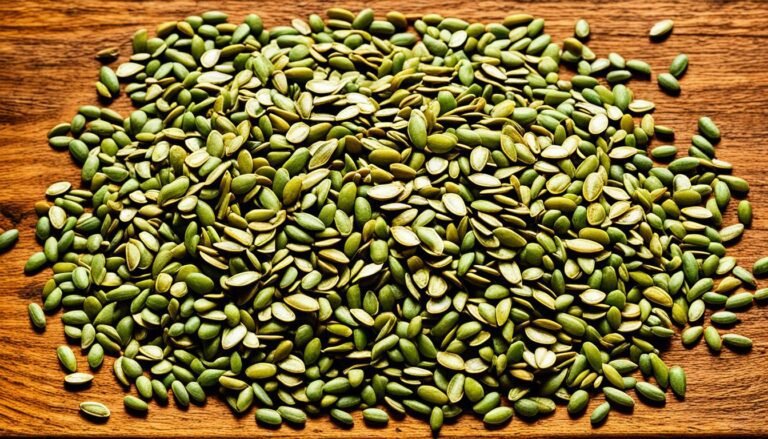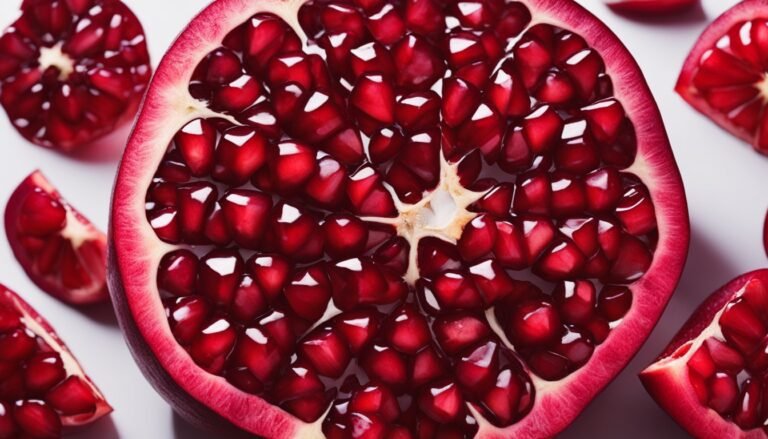Nutritional Benefits of Amaranth Seeds: A Superfood
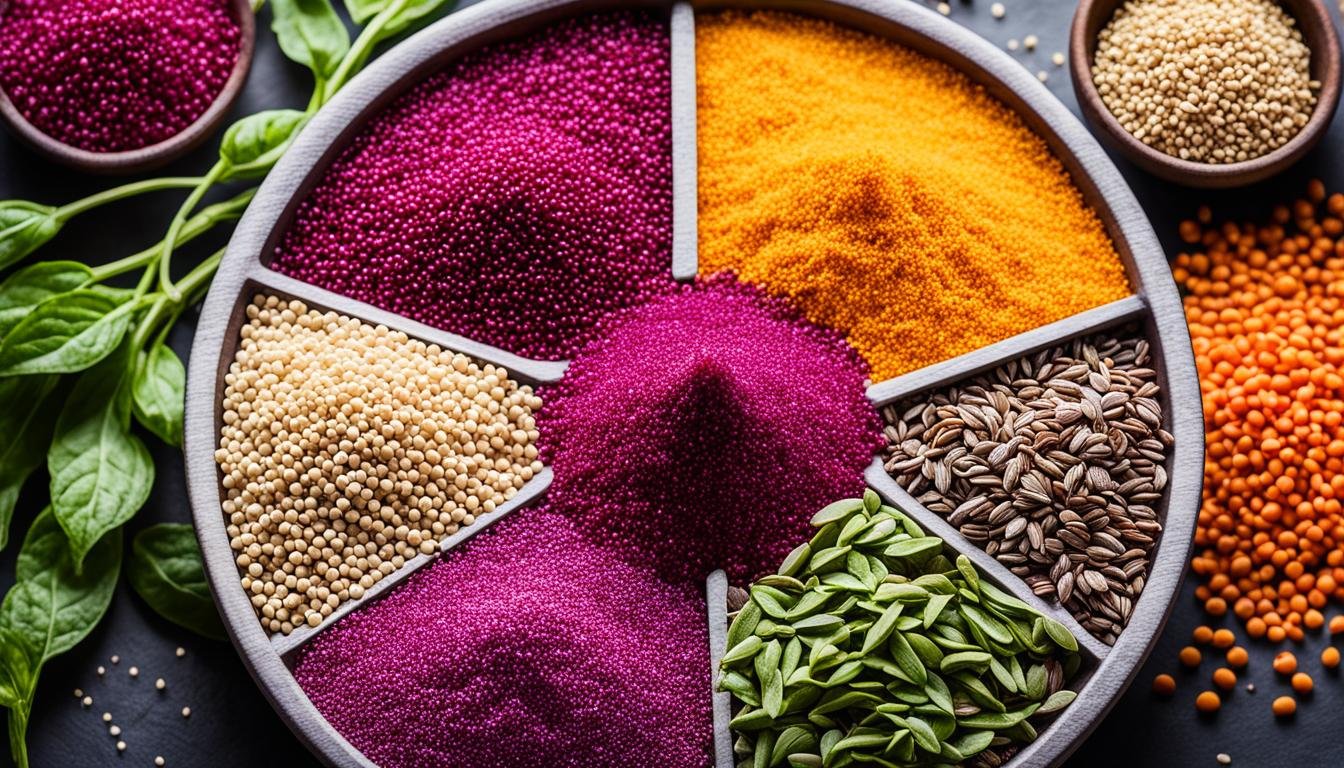
Amaranth is an ancient grain that has been around for thousands of years. It was a key food for the Aztecs and is still important in many diets today. Amaranth is a superfood because it’s packed with protein, fiber, vitamins, minerals, and antioxidants. We’ll look at how adding amaranth seeds to your diet can boost your health.
What is Amaranth?
Amaranth is an ancient grain that’s getting attention for its great nutrition. It’s a flowering plant in the Amaranthaceae family with a long history. The name comes from the Greek “amarantos,” meaning “unfading” or “immortal,” fitting for its bright, lasting flowers.
Ancient Origins and Cultural Significance
Amaranth was key in ancient cultures like the Aztec and Inca empires in Central and South America. It was more than food; it was important for their culture and beliefs. The seeds were used in special rituals, showing how much they valued it.
Now, people all over the world grow and eat amaranth, loving its health benefits. From the Andes to everywhere, amaranth has proven its worth as a superfood.
Amaranth’s story is one of adaptability and its amazing nutrition. Its history and cultural importance make it even more interesting. This superfood is unique and versatile, and its story is still being written.
Amaranth: A Gluten-Free Superfood
Amaranth is a standout grain known for its great nutrition and being gluten-free. It’s different from wheat, rye, and barley because it doesn’t have the proteins that can cause problems for people with celiac disease or gluten intolerance. This makes amaranth a great choice for those who need to avoid gluten.
Amaranth is more than just gluten-free. It’s packed with protein, fiber, vitamins, minerals, and antioxidants. This mix of nutrients and its gluten-free status makes amaranth a top choice for health-conscious eaters.
This grain has been around for 8,000 years, mainly in Mexico, Central America, and the Andes. Its seeds are tiny, just a millimeter big, but they’re full of nutrition. Amaranth is small but mighty in terms of nutrition.
The taste of amaranth is mild, nutty, and slightly peppery. It’s versatile in cooking. You can use amaranth flour in gluten-free breads, muffins, and pancakes. Popped amaranth is also popular, often found in traditional Mexican snacks like Alegría.

Amaranth is a superfood thanks to its amazing nutrition and gluten-free status. It’s a grain that should be part of a healthy diet. Discover the many benefits of this incredible grain.
Nutritional Benefits of Amaranth Seeds
Amaranth seeds are a superfood packed with essential nutrients. They are a great source of high-quality protein. This protein includes all the amino acids you need, like lysine. Amaranth has about 14% protein, which is almost twice as much as corn and rice.
These seeds are also full of dietary fiber, which is good for your digestive health and blood sugar levels. They are a good source of minerals like calcium, iron, magnesium, and phosphorus. Plus, they have vitamins C, K, and B-complex.
One cup of cooked amaranth has 251 calories, 46 grams of carbs, 5.2 grams of fiber, and 9.3 grams of protein. Compared to quinoa, amaranth has more calories and protein. It has 251 calories and 9 grams of protein per cup, while quinoa has 222 calories and 8 grams of protein.
| Nutrient | Amaranth (1 cup cooked) | Quinoa (1 cup cooked) |
|---|---|---|
| Calories | 251 | 222 |
| Protein (g) | 9.3 | 8.0 |
| Carbohydrates (g) | 46.0 | 39.4 |
| Fiber (g) | 5.2 | 5.2 |
| Iron (mg) | 2.6 | 2.8 |
| Magnesium (mg) | 160 | 118 |
| Phosphorus (mg) | 456 | 284 |
Amaranth seeds have an impressive nutritional profile. They are a top choice among superfood grains. With their mix of protein, fiber, and essential vitamins and minerals, amaranth seeds can greatly improve your health and well-being.
High-Protein Content
Amaranth seeds are packed with protein, making them a great choice for health lovers. They have all the essential amino acids, including lysine, which is rare in cereal grains. This makes amaranth a complete plant-based protein.
Each cup of cooked amaranth has about 9 grams of protein. This is a lot for a grain. Plus, the protein in amaranth is easy for your body to use. It’s perfect for those who want more plant-based protein.
Amino Acid Profile and Bioavailability
Amaranth has a great mix of amino acids. It has all nine essential amino acids, including the hard-to-find lysine. This mix makes amaranth a top choice for plant-based protein.
Studies show that amaranth protein is very bioavailable. This means your body can use it well. This is rare in grains, making amaranth stand out.
| Nutrient | Amount per Cooked Cup | Percent of Daily Value |
|---|---|---|
| Protein | 9 grams | 18% |
| Fiber | 4 grams | 16% |
| Iron | 5 milligrams | 45% |
| Magnesium | 160 milligrams | 38% |
Amaranth is a top choice for plant-based protein because of its high protein, balanced amino acids, and easy-to-use protein. Adding it to your diet can boost your nutrition and health.
Rich in Dietary Fiber
Amaranth seeds are packed with dietary fiber, offering 6.7 grams per 100 grams. This fiber meets 17% of the daily fiber need, making amaranth great for gut health.
The fiber in amaranth includes both soluble and insoluble types. Soluble fiber aids digestion and helps with blood sugar and cholesterol levels. Insoluble fiber makes you feel full, aiding in weight control.
Amaranth is more than just fiber. It’s also rich in protein, vitamins, and minerals. With 13-15 grams of protein per 100 grams, it’s a top choice for vegetarians and vegans.
| Nutrient | Amount per 100g | % Daily Value |
|---|---|---|
| Dietary Fiber | 6.7g | 17% |
| Calories | 371 | – |
| Protein | 13-15g | – |
| B-complex Vitamins | Folates, Niacin, Thiamin, Pantothenic Acid | – |
| Vitamin E | 8% Daily Value | 8% |
| Minerals | Calcium, Iron, Magnesium, Phosphorus, Selenium, Zinc | – |
Adding amaranth to your meals is an easy way to increase fiber intake and support digestive health. Enjoy it as a grain, a snack, or in recipes. Amaranth’s high fiber content makes it a valuable addition to your diet.

Antioxidant Properties
Amaranth seeds are full of antioxidants like gallic acid and vanillic acid. These antioxidants fight off harmful free radicals. They help prevent oxidative stress and chronic health problems. Eating amaranth antioxidants often can protect your cells and boost your health.
Protection Against Oxidative Stress
The antioxidant properties of amaranth can also reduce inflammation in your body. This is key to fighting many health issues. They help fight oxidative stress and keep inflammation in check, leading to better health.
A study showed that green morph amaranth has a strong antioxidant capacity. It ranged from 27 to 48 μg g−1 Trolox equivalents. This makes it a superfood rich in antioxidants. The study also found four types of green morph amaranth that are extra rich in antioxidants.
| Nutrient | Amount per Cup (Cooked) |
|---|---|
| Calories | 250 |
| Carbohydrates | 46 grams |
| Protein | 9 grams |
| Fiber | 5 grams |
| Vitamins | B and E |
| Antioxidants | Vitamin E, ferulic acid, squalene |
Adding amaranth antioxidants to your daily meals is a great way to stay healthy. It helps your body fight oxidative stress and supports your natural defenses.
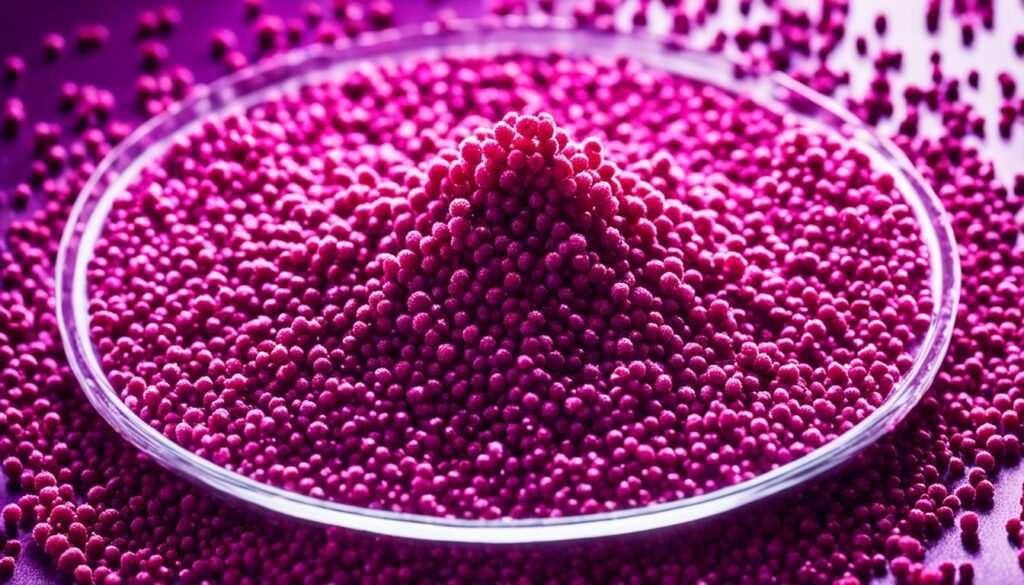
Heart-Healthy Benefits
Amaranth is a superfood packed with nutrients that can help keep your heart healthy. Studies show it may lower “bad” LDL cholesterol without affecting “good” HDL cholesterol. This can reduce the risk of heart disease and stroke.
This grain is full of fiber, protein, and antioxidants. These nutrients help protect the heart. Research found that amaranth can manage cholesterol levels. A trial also showed it’s better for heart health than some other oils.
People with heart disease get better by eating amaranth. They see lower cholesterol and triglyceride levels. Amaranth is also high in phytosterols, which help lower cholesterol and heart disease risk.
Amaranth’s nutritional profile makes it great for the heart. It’s about 15% protein, which helps with weight management by lowering insulin and appetite. It’s also full of antioxidants and essential vitamins and minerals for heart health.
Adding amaranth to your meals is an easy way to boost your heart health. You can eat it as a grain, use it in baking, or take it as oil. The benefits of this superfood are definitely worth trying.
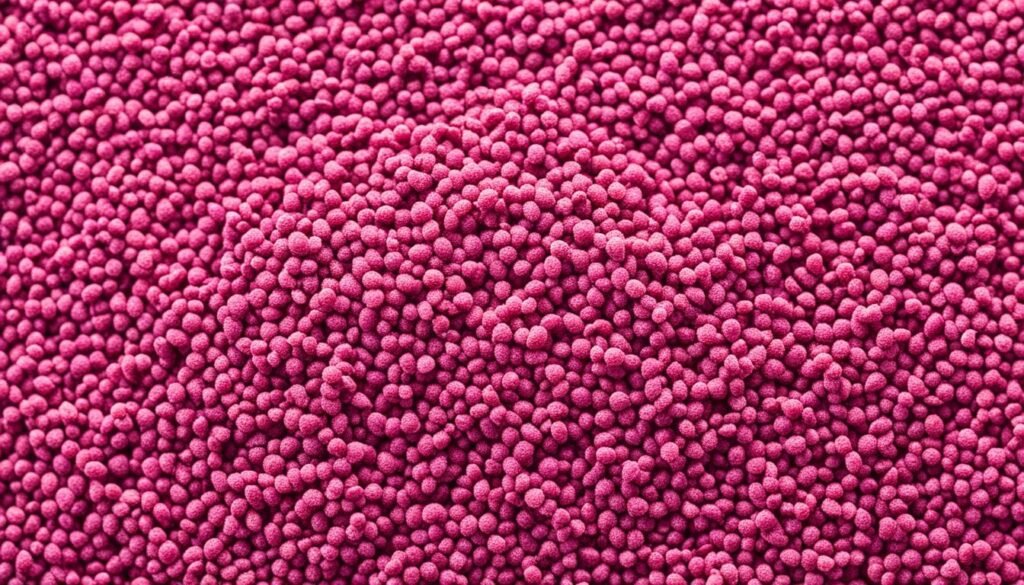
Anti-Inflammatory Potential
Amaranth is a superfood known for its anti-inflammatory benefits. It has peptides and oils that can ease inflammation. These can also lower the production of immunoglobulin E, which causes allergic reactions and inflammation.
This makes amaranth a great food for people with chronic inflammation. Conditions like arthritis, diabetes, or heart disease can benefit from it.
Amaranth contains a compound called lunasin-like peptide. This has been found to prevent cancer and reduce inflammation. The oils in amaranth, such as squalene, can lower bad cholesterol. This helps with heart health and reduces inflammation.
In a study, patients with heart disease ate amaranth and saw lower cholesterol and triglyceride levels. This shows its benefits for heart health and fighting inflammation.
Amaranth is also high in fiber, with about 6 grams per serving. This helps with weight control and supports a healthy inflammatory response.
Compared to other grains, amaranth has a lot of protein and amino acids. It has a lot of lysine, an essential amino acid. This makes it a great choice for plant-based diets and fighting inflammation.
Overall, amaranth’s nutrients, like its peptides, oils, and high-quality protein, suggest it’s good for managing inflammation and improving health. Adding amaranth to your diet could be a simple way to use this ancient superfood’s anti-inflammatory benefits.
Nutritional Benefits of Amaranth Seeds
Amaranth seeds are packed with vitamins, minerals, and other good stuff. They are small but powerful, offering many health benefits. This makes them a top superfood choice.
One big plus of amaranth seeds is their high protein content. A single cup of cooked amaranth has 9.4 grams of protein. This is more than quinoa, which has 8 grams per cup.
| Nutrient | Amaranth | Quinoa |
|---|---|---|
| Protein (per cup) | 9.4g | 8.0g |
| Iron (per cup) | 5mg | 3mg |
| Vitamin B6 (% RDI) | 22% | 18% |
Amaranth seeds are also full of important vitamins and minerals. They have a lot of vitamin A, vitamin C, vitamin E, vitamin K, and B-complex vitamins. Plus, they have calcium, iron, magnesium, phosphorus, and zinc.
These seeds are great for your health and well-being. Adding them to your diet can help your immune system, heart, and even with weight control.
If you want to eat healthier, try amaranth seeds. They’re packed with nutrients and offer many health benefits. They’re a great addition to any healthy diet.
Conclusion
Amaranth seeds are a superfood packed with nutrients. They are high in protein and fiber and are full of antioxidants. Amaranth benefits your health in many ways. Adding them to your meals can boost your health and well-being.
They have more protein, fiber, and amino acids than common grains. They also help fight inflammation and support heart health and weight control. This makes amaranth a top choice for a healthy diet.
Why not add amaranth benefits to your meals? You can use amaranth flour in baking or enjoy it as a nutritious porridge or snack. This superfood can help you live a healthier life.
FAQ
What are the nutritional benefits of amaranth seeds?
Amaranth seeds are full of essential nutrients. They provide high-quality protein, fiber, vitamins, minerals, and antioxidants. These nutrients offer many health benefits.
Is amaranth a gluten-free grain?
Yes, amaranth is gluten-free. This makes it a great choice for people with celiac disease or gluten intolerance.
How does the protein in amaranth seeds compare to other grains?
Amaranth has one of the most complete plant-based proteins. It has all the essential amino acids. This includes lysine, which is often missing in cereal grains.
What are the benefits of the dietary fiber in amaranth seeds?
Amaranth seeds are full of soluble and insoluble fiber. This fiber helps with bowel movements, blood sugar, and cholesterol levels. It also makes you feel full.
What are the antioxidant properties of amaranth seeds?
Amaranth seeds have antioxidants like gallic acid and vanillic acid. These antioxidants fight harmful free radicals and reduce inflammation in the body.
How can amaranth benefit heart health?
Studies show that amaranth and its oils can lower “bad” LDL cholesterol. They don’t affect “good” HDL cholesterol. This could lower the risk of heart diseases.
Does amaranth have anti-inflammatory properties?
Yes, amaranth has peptides and oils that can reduce inflammation. They also lower the production of immunoglobulin E. This can prevent allergic reactions and inflammation.
What other vitamins and minerals are found in amaranth seeds?
Amaranth seeds are rich in vitamins A, C, E, and K, and B-complex vitamins. They also have calcium, iron, magnesium, phosphorus, and zinc. These minerals and vitamins are essential for good health.



